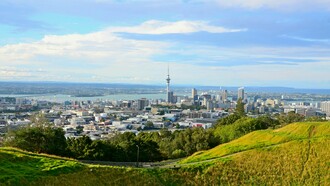In a move aimed at strengthening rapprochement between the two countries and following France's recognition of the Western Sahara autonomy initiative, the French president arrived in Morocco on Monday for a three-day visit, at the invitation of Moroccan King Mohammed VI.
On the second day of his visit to Rabat, French President Emmanuel Macron affirmed in a speech before the Moroccan parliament his country's support for "Morocco's sovereignty" over Western Sahara, noting "the present and future of the Sahara fall within the framework of Moroccan sovereignty."
Macron also announced France's commitment to providing investments in the region, following the two countries' signing of agreements worth an estimated 10 billion euros. Macron stressed that his country's position "does not carry any hostility towards any party, but rather a call for cooperation with all parties seeking to enhance stability and development," Macron said.
The Moroccan monarch received his guest at the airport before they headed together to the royal palace in an official procession. A bilateral meeting was then held, followed by the signing of agreements in various fields, including defense, security, immigration, energy, and education.
The visit appears to be a protocol, but it is of double importance as it is Macron's first visit to Morocco since 2018, in addition to coming after nearly three years of tension and diplomatic coldness between Paris and Rabat. These relations were greatly affected by the "Pegasus" case, which erupted following media investigations in the summer of 2021, which included accusations that Morocco was spying on French officials, including President Emmanuel Macron.
Despite Morocco's denial of involvement at the time, the case left negative effects on relations between the two countries, and then France's decision in September 2021 to tighten visa requirements for Moroccans deepened the dispute further. The situation calmed down relatively after former French Foreign Minister Catherine Colonna visited Morocco in January 2022 and announced the end of the visa crisis.
However, the differences resurfaced again in 2023 with Moroccan accusations that France was behind European reports criticising the state of press freedom in Morocco, in addition to Rabat's displeasure with the French rapprochement with Algeria, and Rabat demanded a clearer position on the Moroccan Sahara issue.
The Sahara is a turning point in the return of relations
The Trump administration recognised the Moroccan Sahara in December 2020. Rabat classifies its partners and opponents based on their position on the Sahara issue, and this classification was further consolidated after the administration of U.S. President Donald Trump recognised Morocco's sovereignty over the Sahara in late 2020. For decades, France has tried to maintain "neutrality" in the Moroccan Sahara conflict, seeking to maintain a policy of balance in its relations with both Algeria and Morocco.
However, on July 30, a shift occurred in the French position, as Macron announced his support for Morocco's initiative for autonomy, considering it the "only solution" to the conflict. This position ended the period of diplomatic coldness between the two countries, as signs of rapprochement appeared with the appointment of a new Moroccan ambassador to Paris and the acceleration of mutual ministerial visits in preparation for Macron's visit.
Morocco is trusted partner for France and Europe
The great interest in Macron's visit is not limited to its attempt to restore warmth to relations between the two countries, but also extends to the sensitive regional and international context that accompanies it, especially in light of the increasing political and security challenges in the Middle East and the African Sahel region.
This context gives the visit a special strategic dimension for France, which finds itself faced with the need to strengthen its presence and role through partnerships that guarantee its interests in Africa, especially after the decline of its influence in the region and the orientation of many countries.
Morocco, thanks to its position and strong relations in Africa, can play a strategic role in reformulating France's interests on the continent. The kingdom is a reliable historical partner for France as it has remained committed to the liberal system led by the West, especially towards the United States and France.
Morocco is not only a vital gateway to the Sahel and Sahara region, but also a leader in foreign investments in several African countries, becoming the second largest African investor after South Africa. France has realised the importance of Morocco as a strategic partner, so the French visit reflects a strategic shift in relations with an affirmation of support for the Moroccan position on the Sahara.
France relies on Morocco in several files, unlike Algeria, which considers the French military presence in the Sahel region to be useless. Economic issues represent an important point for France as it sees that commercial dealings with Morocco are smoother than dealings with Algeria.
Morocco and France economic interests
France has maintained its position as Morocco’s top economic partner, with around 1,300 French companies operating in the country, with investments amounting to around €8.1 billion in 2022. The improvement in French-Moroccan relations opens up new horizons for French companies affected by political differences, which may boost their interest in investing in Moroccan Sahara—especially in the energy, water desalination, and infrastructure sectors.
Alstom, a company specialising in power generation and railway infrastructure, also has a strong chance of winning the contract to supply new trains for the planned high-speed line between Marrakech and Kenitra. Morocco’s hosting of the 2030 World Cup in partnership with Spain and Portugal is also a major investment opportunity for France to offer its expertise in infrastructure.
Immigration and security cooperation
Moroccan authorities have thwarted more than 45,000 illegal immigration attempts since the beginning of 2024. Immigration plays a pivotal role in Moroccan-French relations, as Paris considers Rabat a strategic partner in the face of European pressure to limit illegal immigration.
Analysts believe that one of the main reasons that prompted France and Spain to take their positions on the Sahara is "the fear of exploiting the immigration card to pressure them as the Europeans are very concerned about illegal immigration and are counting on Morocco to confront it as it is the closest country to Europe."
Other analysts point out that Morocco's arrest of about 87,000 migrants in 2023 shows its commitment to security cooperation with Europe as Moroccan authorities say they have thwarted more than 45,000 illegal immigration attempts since the beginning of this year.
Despite the fluctuations in relations between Morocco and France, historical and cultural ties between the two countries have remained strong. French is the first unofficial language in Morocco and the constants of French policy towards Morocco are not affected by the rotation of presidents between the right and the left, which may reflect the stability of the relationship between the two countries.














